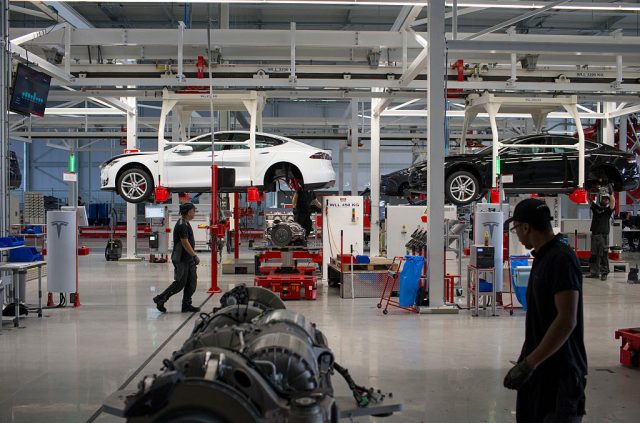
The feud between Elon Musk company Tesla Motors and an auto blogger has sparked an indignant open letter from the company.
The feud started on Wednesday when Edward Niedermeyer posted on his blog, the Daily Kanban, that while investigating reports of suspension breakage in Tesla’s Model S and X cars he found something troubling. A poster in a Tesla Motors forum claimed the suspension in his 2013 Model S had failed. The car had 70,000 miles on it and was out of warranty, so Tesla apparently told the owner that the company would not pay for his repairs. Several days later, Tesla contacted him and offered to pay for 50 percent of the repairs if he agreed to sign a Goodwill Agreement. The agreement stipulated that the owner of the Model S would keep confidential the details of the incident and the work required to fix the car.The Daily Kanban posted part of the agreement, which reads:
You agree to keep confidential our provision of the Goodwill, the terms of this agreement, and the incidents or claims leading or related to our provision of the Goodwill. In accepting the Goodwill, you hereby release and discharge Tesla and related persons or entities from any and all claims or damages arising out of or in any way connected with any claims or incidents leading or related to our provision of the Goodwill. You further agree that you will not commence, participate, or voluntarily aid in any action at law or in equity or any legal proceeding against Tesla or related persons or entities based upon facts related to the claims or incidents leading to or related to this Goodwill.
In his blog, Niedermeyer claims that this agreement is an attempt by Tesla to block the owner of the vehicle from reporting damage and issues with the car to the National Highway Traffic Safety Administration (NHTSA). The owner notified the NHTSA anyway and claimed that the administration is currently investigating Tesla’s suspension issues.
But on Thursday night, Tesla shot back with an open letter defending the suspension systems in its cars and accusing Niedermeyer of fabricating the report. The letter even suggests that Niedermeyer might have done it to win big by shorting Tesla stock.
The company adds that it was well aware of the problematic suspension mentioned in Niedermeyer’s post, but Tesla says the car owner didn’t tell the whole story:
With respect to the car that is discussed in the blog post that led to yesterday’s news... the suspension ball joint experienced very abnormal rust. We haven’t seen this on any other car, suggesting a very unusual use case. The car had over 70,000 miles on it and its owner lives down such a long dirt road that it required two tow trucks to retrieve the car. (One to get the car to the highway and one to get it from the highway to the service center.) When we got the car, it was caked in dirt.
According to Tesla, the NHTSA requested additional information on its suspension systems on April 20. In the subsequent weeks, the administration told Tesla that it needed no new information from the electric car maker and that it was unable to identify any safety issues with the car's suspension.
However, a Wall Street Journal report on Thursday afternoon includes the following statement from the NHTSA:
NHTSA is examining the potential suspension issue on the Tesla Model S and is seeking additional information from vehicle owners and the company... NHTSA learned of Tesla’s troublesome nondisclosure agreement last month. The agency immediately informed Tesla that any language implying that consumers should not contact the agency regarding safety concerns is unacceptable, and NHTSA expects Tesla to eliminate any such language.
As for the Goodwill Agreement, Tesla calls it “preposterous” to claim that the agreement prevents the owner from reporting issues to the NHTSA. “The basic point is to ensure that Tesla doesn’t do a good deed, only to have that used against us in court for further gain... We will take a look at this situation and will work with NHTSA to see if we can handle it differently, but one thing is clear: this agreement never even comes close to mentioning NHTSA or the government, and it has nothing to do with trying to stop someone from communicating with NHTSA or the government about our cars.”
Niedermeyer also notes in his blog post that two other car failures documented in the Tesla Motors forums have been resolved with out-of-warranty work from Tesla accompanied by a similar Goodwill Agreement. Tesla did not address those two issues in its Thursday night letter.
Finally, the company accused Niedermeyer of fabricating his report, noting that he previously wrote a post called “Tesla Death Watch” in 2008. “We don’t know if Mr. Niedermayer’s [sic] motivation is simply to set a world record for axe-grinding or whether he or his associates have something financial to gain by negatively affecting Tesla’s stock price, but it is important to highlight that there are several billion dollars in short sale bets against Tesla,” the company wrote. “This means that there is a strong financial incentive to greatly amplify minor issues and to create false issues from whole cloth.”
This isn’t the first time Tesla has attacked a writer with a poor opinion of Tesla. In 2013 The New York Times wrote a scathing review of the car, faulting it for range and battery issues. Elon Musk called the review “fake” and pulled the logs for the electronic vehicle, pointing out where he thought the reviewer had made mistakes in judgement while operating the Model S. Two weeks later, Tesla said it lost “tens of millions” of dollars in canceled orders because of The New York Times review.
Listing image by Getty Images | Jasper Juinen/Bloomberg
reader comments
175